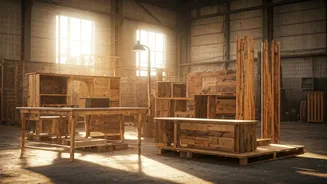Waste to Wonder
The Perungudi dumpyard in Chennai, once a symbol of waste and pollution, is now the site of an innovative project that redefines waste management. Instead
of remaining an unsightly accumulation of trash, the discarded materials here are being given a second life. This transformation is not just about cleaning up the environment; it is also about creating valuable resources. The project’s central aim is to find practical and sustainable solutions to tackle the problem of waste disposal. It focuses on turning trash into something useful, particularly furniture. This approach reduces the environmental footprint and showcases the potential of innovative recycling techniques. The initiative is a testament to human ingenuity, showing how problems can be turned into opportunities and creating both environmental and social benefits.
Materials and Methods
The process begins with the careful sorting of waste materials. The Perungudi project focuses on materials such as plastic, wood, and metal scraps commonly found in the dumpyard. These are collected and then prepared for recycling. Advanced methods are used to clean, process, and combine these materials. This often involves crushing, melting, and reshaping the waste into components that can be used for furniture. The project employs a variety of techniques to create different pieces of furniture. Some methods might use recycled plastic to mold chairs and tables, while others might repurpose wooden pallets into benches or shelves. Metal scraps are skillfully fashioned into frames and supporting structures, showcasing the versatility of waste materials. Each piece of furniture is a unique example of recycling in action, demonstrating the ability to turn what was once considered unusable into something beautiful and functional.
Community Impact
The initiative at the Perungudi dumpyard extends its benefits beyond environmental improvements. The project strongly emphasizes its positive social impact by creating opportunities for the local community. It provides jobs to individuals who are involved in waste sorting, processing, and furniture production. This employment helps to empower residents, offering them a chance to earn a sustainable livelihood. The project also contributes to skill development. Workers are trained in various aspects of recycling and furniture making, leading to increased employability. Furthermore, the availability of affordable, eco-friendly furniture benefits the community by offering options that are both sustainable and budget-friendly. This helps raise awareness about environmental sustainability. The Perungudi project also serves as an educational tool. It gives a practical example of how waste can be turned into valuable resources, inspiring other community members to adopt more sustainable practices.
Sustainable Solutions
This Chennai-based project shows a practical example of sustainability by changing how waste is perceived and managed. The process of converting waste into furniture directly tackles the problem of landfill overload, which is a significant environmental concern. By recycling materials, the project lessens the need for raw materials, thereby reducing deforestation, mining, and other extractive processes that harm the environment. This effort aligns with the principles of a circular economy, where resources are kept in use for as long as possible, reducing waste and the demand for new resources. This also makes the environment better by reducing pollution. The project encourages sustainable production and consumption patterns by showcasing that waste reduction is possible. This supports a broader shift towards eco-friendly practices within the community. Through its initiatives, the project shows that waste management can be done in an effective way, improving the health of our planet.
Future Prospects
The Perungudi project has set a precedent, and is now looking toward the future, seeking to scale up its operations and extend its influence. One primary goal is to increase production capacity to meet growing demand. To do this, the project plans to invest in better equipment and technology that will allow for faster and more efficient waste processing. This also includes the development of new product designs. It will help to broaden the range of furniture items available, appealing to a wider customer base. Expansion plans also involve collaboration with other organizations. The goal is to build partnerships with government agencies and other local businesses to improve resources and market reach. The project is also working on strategies to expand its reach. They aim to replicate the model in other regions that will help in creating a broader network of waste-to-furniture projects. Through these future plans, the Perungudi project will continue to promote sustainable solutions to waste management across Chennai.















